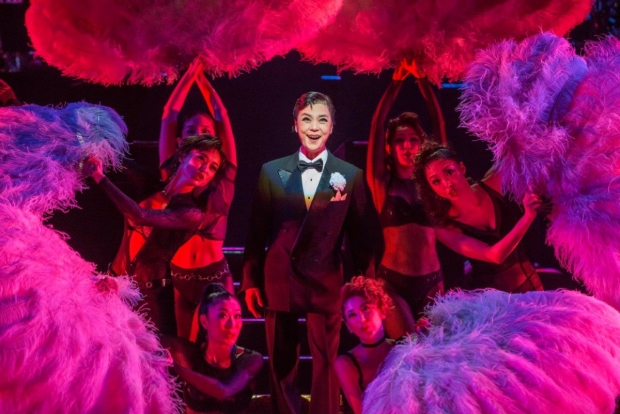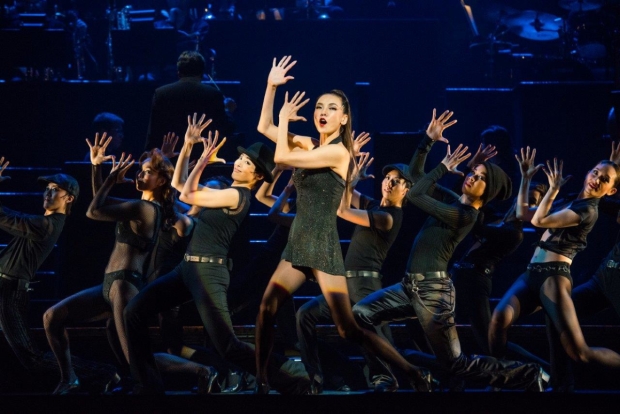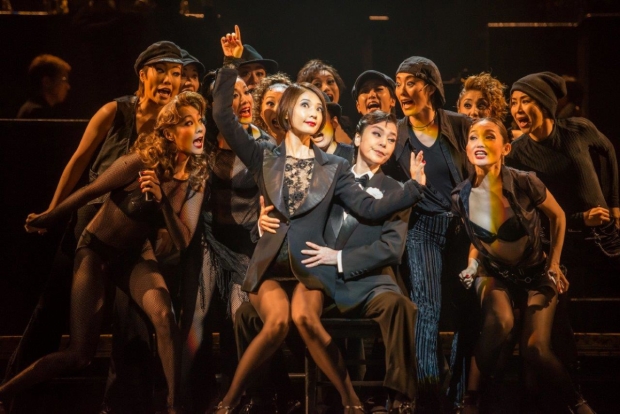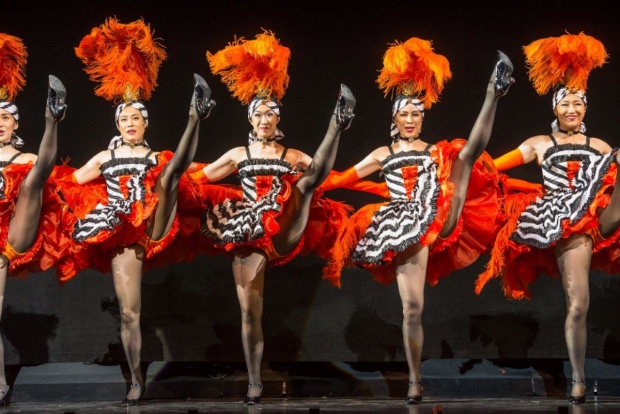Takarazuka in Chicago

(© Stephanie Berger)
The Japanese have a very special relationship with fame: Just watch Lady Gaga step off a plane and into a sea of crazed fans in Tokyo if you need any proof. So Chicago (John Kander, Fred Ebb, and Bob Fosse's dark meditation on fame in America) seems like a perfect fit for Takarazuka, Japan's century-old all-female musical-theater troupe, which regularly produces spectacles reminiscent of the glory days of the Ziegfeld Follies. Of course, Chicago is more about infamy, the kind of tabloid fame for which Americans (with our Kardashians and Duggars) still regularly win the gold medal. What will Takarazuka make of that?
Not much, unfortunately. This competent mounting never rises above the level of a very good high school production, in which the thrill of performing tends to overpower any other emotions found in the script: With the exception of Yuma Hanazuki's smoldering June, the six "merry murderesses" of the "Cell Block Tango" are just a little too merry, their singing and dancing a little too perfect. Their elegant limbs extend and isolate in the unmistakable style of Fosse. It's technically very impressive, but it doesn't really serve a story that is so much about ugliness and violence.

(© Stephanie Berger)
Chicago is the Jazz Age tale of Roxie Hart (the effervescent Hikaru Asami) and Velma Kelly (the graceful Yoka Wao), two murderers who, with the help of greasy lawyer Billy Flynn (Saori Mine, with a knowing grin), manipulate the press to escape justice. They each hope that their fame will last beyond their respective trials, especially bored housewife Roxie. She doesn't seem to realize that notoriety is fleeting when there's always a new sensational headline burning up the printing press.
Seeing a Japanese language production of this classic Broadway musical is a treat unto itself, especially for those of us who know the words to all the songs by heart. You haven't truly experienced the international reach of Broadway until you've heard a Japanese actress perform a Hungarian monologue on an American stage. Since the property is so well-known, an enterprising director has a chance to bring a fresh perspective to any foreign-language production. It is an opportunity that Takarazuka unfortunately chooses not to take. Director David Hyslop's staging is a facsimile of the Walter Bobbie revival currently playing on Broadway (now in its 20th year), complete with musicians framed by John Lee Beatty's bandstand and the dancers scantily clad in William Ivey Long's black costumes.
The Broadway production has remained fresh, thanks to committed performances and a healthy dose of stunt casting. But here, one almost gets the sense that this special presentation for the Lincoln Center Festival is just an extension of that highly successful publicity strategy. But Takarazuka benefits from no winking cameos from reality-TV stars: With the exception of the extraordinarily talented countertenor T. Okamoto (who plays Mary Sunshine), all of the actors in this production are drawn from the Takarazuka troupe.

(© Stephanie Berger)
The company conveys Chicago's story of corrosive, dehumanizing fame on an intellectual level. The cast's indicative style of acting even jibes with Kander and Ebb's neo-Brechtian aesthetic, in which the performers keep just one foot inside their characters and are always aware of the audience. What is missing is the animal passion also inherent in the show, the primal dance between sex and death that we feel in the gut. This version is pretty; it's funny; but it's never really hot.
Admittedly, the pairing of Takarazuka and Chicago is an odd one: Takarazuka is all about a beautiful fantasy of ideal men and women. Kander and Ebb have built a career in exposing the cracks in such perfect facades: Chicago, in particular, is the grotesque portrait hiding in America's attic as we continue to convince ourselves and others that our values are flawless and ageless.

(© Stephanie Berger)
Seeming to recognize this disconnect, Takarazuka treats us to an encore of their more typical fare and that final 20 minutes makes the whole evening worth it. The women are beyond lovely in their whimsical gowns. All the "men" sport the same wavy haircuts and glittering goth tuxedoes — it's as if Liberace were turned into an anime villain (gorgeous and imaginative costumes for the encore designed by Jun Arimura). As the entire company dances to "That's Life" (yes, the same standard made famous by Frank Sinatra), we recognize this beautiful and highly specific lie for what it is: pure, joyous entertainment. We couldn't ask for a better nightcap to the bitter pill that is Chicago.











